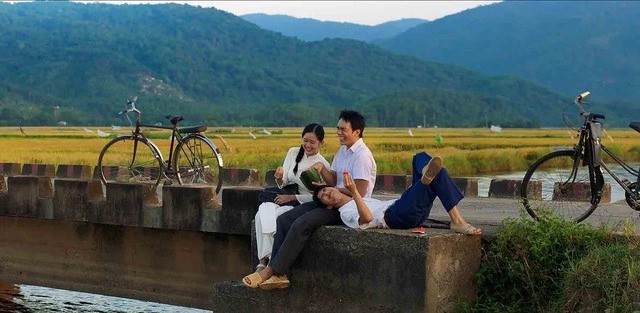The film poignantly reaches out to those who may have grown skeptical of love, reigniting their belief in its possibilities and inspiring a renewed desire to love again. It serves as a gentle reminder of love's enduring power to transform and heal, making 'Once Upon a Love Story' not just a cinematic journey, but a heartfelt invitation to open up to love once more.

A scene from the movie 'Once Upon a Love Story'. Photo courtesy of the film distributors
HÀ NỘI Ngày xưa có một chuyện tình (Once Upon a Love Story) – a feature film based on the novel of the same name by established author Nguyễn Nhật Ánh, captures the delicate essence of love, brings us into a world of compassion, forgiveness and an extraordinary sense of kindness.
Directed by Trịnh Đình Lê Minh, the film invites audiences to look beyond romance and consider the nature of love as it intertwines with friendship, sacrifice and growth.
Set against the poetic backdrop of central Việt Nam in 1999-2000, Once Upon a Love Story leads us to a bygone era, capturing the essence of youth with nostalgic beauty. There’s a timelessness in the way the film captures sunlit days, the charm of an old school, a tranquil stream, shared laughter and innocent glances—all evoking a deep sense of nostalgia and the peacefulness of the old days.
Watching this film feels like stepping back into a simpler time, where the purity of first love and the warmth of friendship bloom naturally, like the fields of Phú Yên Province where much of the movie was filmed.
Minh’s cinematic style has a comforting touch, much like his previous work, Goodbye Mother and carries that same delicate, soft beauty that appeals to the heart.
At its core, Once Upon a Love Story is a tale of three friends: Miền (played by Ngọc Xuân), Vinh (Avin Lu) and Phúc (Nhật Hoàng), whose childhood friendship evolves into a complex love triangle as they grow up.
The director’s choice to let the film breathe slowly in its early scenes allows viewers to feel as though they are stepping into memories, where every small gesture carries weight.
Cinematography is one of the film’s strongest assets; each shot seems to carry the warmth of Vietnamese summers and the soft, fleeting quality of youth.
The film’s pace picks up as it dives into the complexity of adolescent emotions. With minimal dialogue, the actors convey their characters, feelings through gestures and expressions, creating a sense of intimacy that is rare in modern cinema.
Each of the three main characters is distinct yet connected by their shared history. Miền, played with quiet strength by Ngọc Xuân, is gentle but resolute, making tough choices when necessary.
Phúc, brought to life by Nhật Hoàng, has a loyal, spirited nature that makes him a natural friend to Vinh and a source of warmth in their trio. Avin Lu’s portrayal of Vinh is filled with a kind-hearted simplicity that endears him to the viewer, making his sacrifices throughout the film feel genuinely moving.
Once Upon a Love Story presents love as a complex, evolving emotion that sometimes demands letting go, sacrificing, or choosing the path of kindness over passion. Through each character’s growth, the film suggests that while love might change or fade, kindness and compassion endure.
Director Minh weaves a personal message, as if sharing with each viewer their own private understanding of love.
The film’s art direction and cinematography are beautifully crafted, with careful attention to the Vietnamese countryside. The village of Phô Thị appears as a peaceful haven, with yellow walls and mossy tiles and the visual nostalgia is heightened by details like the old bookshelf in Phúc’s grandfather’s house and a classic poster of Bittersweet Love.
These visual choices, paired with the meticulous set design and use of local details, immerse the audience in the era and setting, creating a vivid sense of place. (The team disclosed that they planted 3,600 corn plants to capture sweeping drone shots, underlining their commitment to authenticity.)
The score to Once Upon a Love Story becomes its own character, filling the spaces left by unspoken words. The soundtrack, thoughtfully selected, enhance the film’s emotional depth.
Avin Lu’s original composition Tình Tính Tang resonates as a silent love song, while Tùng’s Xa (Waiting for the Wind) brings a touch of longing and nostalgia. Each song feels carefully placed, adding layers to the characters’ emotional journeys without overwhelming the story.
The film’s conclusion, where the characters reflect through inner monologues, may not appeal to all audiences, as it contrasts with the 'show, don’t tell' approach typically valued in visual storytelling.
Yet, this choice adds a layer of introspection that feels true to the characters’ journeys and to the original story. The monologues allow each character to speak to their hopes, regrets, and choices, closing the film with a sense of poetic honesty.
For anyone who cherishes the beauty of quiet moments and the depth of subtle emotions, Once Upon a Love Story is a cinematic experience worth savouring.
The film poignantly reaches out to those who may have grown sceptical of love, reigniting their belief in its possibilities and inspiring a renewed desire to love again.
It serves as a gentle reminder of love's enduring power to transform and heal, making the film not just a cinematic journey but a heartfelt invitation to open up to love once more.
The film is the only Vietnamese film competing for the best feature-length film title at the seventh Hà Nội International Film Festival (HANIFF), which will take place from November 7 to 11. VNS